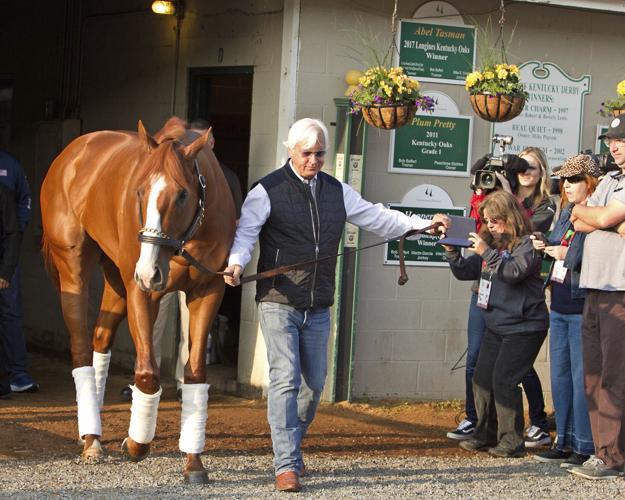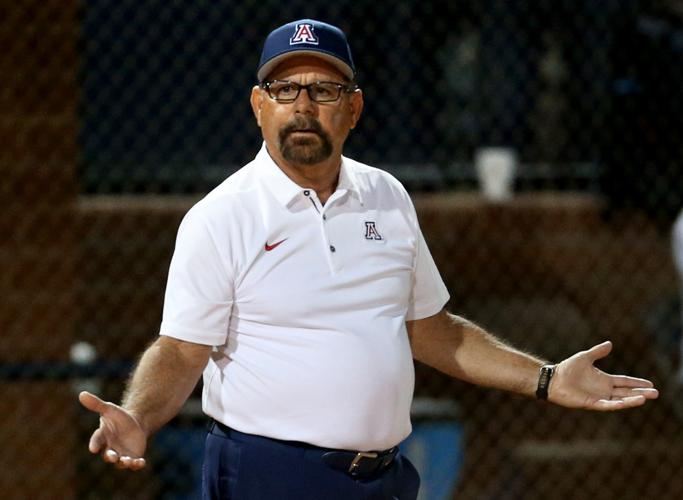The truth, the whole truth, half-truths, shades of the truth and other items admissible as sports news:
ITEM I: Five-time Kentucky Derby winner Bob Baffert’s first victory at a horse track wasn’t as a trainer but as a 22-year-old jockey. It was Jan. 19, 1975 at Tucson’s Rillito Downs.
How times have changed.
In ‘75, Baffert rode his father’s quarter-horse, Baffert’s Angel, a 3-year-old chestnut. Only three horses were in the race, which carried a $500 purse. Attendance for that day’s 11-race card was 1,072 and a total of $61,318 was wagered at the Tucson track.
Compare that to Saturday’s Kentucky Derby victory for Justify at Churchill Downs. Attendance: 153,000. Purse: $2.26 million. Winner’s share: $1.24 million.
And it’s not like the 22-year-old Baffert rode the winner that day in 1975, collected his share (roughly $30) and hit the bar. He also rode Saint’s Banjo in the fifth race and Miss Peggy’s Ohio in the seventh race at Rillito that afternoon.
ITEM II: When Baffert emerged as a Kentucky Derby-caliber trainer in 1996 — his horse, Cavonnier finished second — I went to the Sonoita Fairgrounds for what then was the 82nd annual Sonoita Horse Races. That was Baffert’s home away from his Nogales home as a young trainer/jockey.
I’ve been to seven or eight Sonoita races on Kentucky Derby Saturday and it never fails to entertain, worth every inch of the 100-mile round trip.
In ’96, I spoke to Baffert for the first time and spoke fondly about Blain Lewis, a rancher from Patagonia who was the first to raise (and break) horses for Baffert’s family.
“Look for a guy with a cowboy hat who looks like John Wayne,” Baffert told me.
When I arrived at the horse track that day, I asked a guy who appeared to be in charge of the betting tent if he knew Blain Lewis.
“Come with me,” he said.
Sitting in the shade near the top of the old aluminum grandstand was Blain Lewis, then in his mid 80s. Even at that age, he looked every inch John Wayne, with his cowboy hat, deep voice and weathered skin.
For the next 30 minutes, Mr. Lewis told stories about the Baffert family and their horse racing history. It was like a trip in a time machine. Lewis had been a “constable” in Santa Cruz County, a state livestock inspector and, most of all, a rancher and horseman of the first rank.
I asked him how long he had lived in Patagonia.
“My family traveled hundreds of miles in a covered wagon from New Mexico to some vacant land near Huachuca,” he said. “That was 1912. I broke a lot of horses as a kid, and much later I got to know Bob’s dad and started breaking horses for them.”
These Kentucky Derby victories don’t happen by accident.
ITEM III: Although no one was keeping track, Arizona’s softball team completed its Pac-12 home schedule with an average attendance of 2,348 fans. Mike Candrea’s team has led the Pac-10/12 in home attendance every season since Hillenbrand Stadium opened in 1991.
But this year it was close for the first time ever. Oregon averaged 2,334 in Pac-12 games at new Jane Sanders Stadium, which this year added 1,000 permanent outfield bleacher seats.
It’s not clear how capacity at Hillenbrand Stadium will be affected when an $8 million renovation begins after the Wildcats are expected to play host to an NCAA Regional next weekend.
In the bigger-is-better age of college sports — when schools make sure their new zillion-dollar football video board is at least a foot larger than rival schools — it’s likely that the UA administration will make sure there are more seats at Hillenbrand than at Oregon’s suddenly-trendy Sanders Stadium.
ITEM IV: The Pac-12 baseball season goes on and on and on. Arizona won’t finish the regular season until May 26 at Oregon. That’s 30 conference games, three against every team in the league.
Arizona must still play weekend series against Cal, ASU and Oregon.
The Pac-12 has no plans and apparently no interest in shortening — or squeezing — the regular season and playing a conference tournament. UA coach Jay Johnson told me there appears to be no movement toward a postseason tournament, for which he is grateful.
Why put more innings on the arms of precious pitching staffs before the NCAA Tournament?
The other Power 5 conferences all stage postseason baseball tournaments. The SEC will play May 22-27 at Hoover Stadium in Birmingham, Alabama. That’s college baseball territory. Last year the SEC drew 127,479 fans for its tournament.
The Big 12 is to play its tournament at a Triple-A ballpark in Oklahoma City, which will be the 42nd consecutive year of Big 12 tournament baseball. Even the Big Ten, which is not a college baseball hotbed — did you realize Wisconsin does not have a baseball team? — has established the home of the College World Series at Ameritrade Stadium in Omaha, Neb., as its site for a postseason tournament. It’ll play for five days while Arizona completes the Pac-12 season at Oregon.
The ACC also has a perfect location for its postseason baseball tournament: the Triple-A Durham Bulls’ facility in North Carolina. ESPN2 has agreed to televise the championship game. The ACC expects to draw in excess of 100,000 fans.
The Pac-12 probably wouldn’t draw half that, or even close.
Pac-12 baseball has three teams with relatively strong fan-bases: Arizona, which averages 3,693 for conference games; Oregon State, which averages 3,315, and ASU, which is at 2,683.
You can’t realistically stage a Pac-12 postseason baseball tournament in Tucson or Tempe because it would be too hot. Stanford, which is again a baseball powerhouse, averages only 1,534 in conference games this season. The Los Angeles schools don’t have baseball fan bases of note.
The Pac-12 once fronted the notion of playing a baseball tournament in Salt Lake City, at the Triple-A ballpark downtown, but that idea long ago faded. How could they explain all the empty seats?
If Pac-12 schools were to play a postseason tournament at energized but relatively small 3,500-seat Goss Stadium in Corvallis, Ore., it would sell in an instant. But it would also cost about $30,000 per team for travel expenses to a five-day event.
And that’s if it doesn’t rain.





